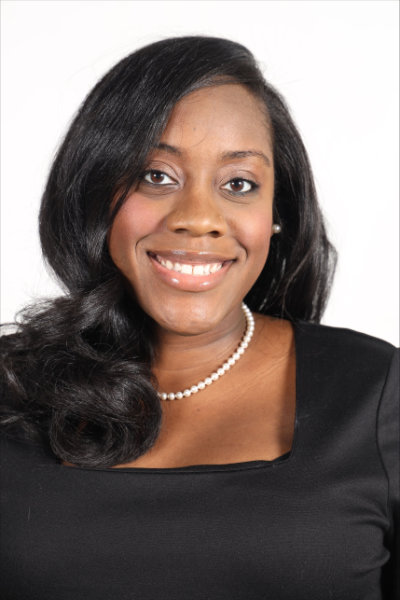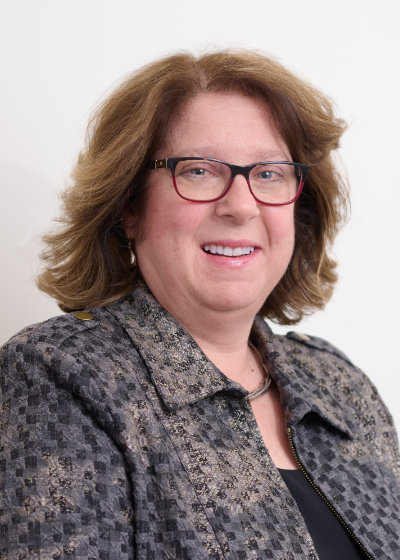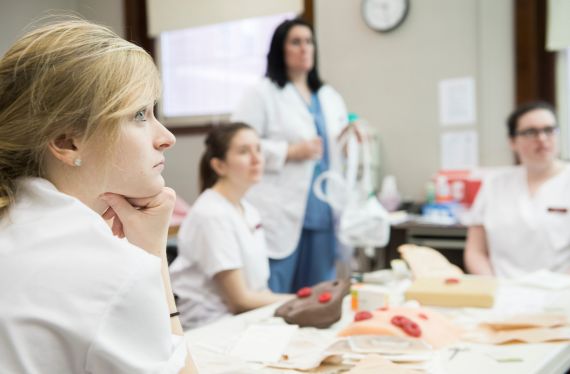Their Last Degree Catapulted These Veteran Leaders into The Big Picture of Nursing
 Before she was a nursing administrator at Brigham and Women’s Hospital, before she became Equity Domain Nursing Co-Leader there and before she joined the faculty of Regis College as an assistant professor, Charlene C. Hollins, MSN ’19, DNP ’24, was an RN in the emergency department at BWH for nearly fourteen years. During that time, she recalls, one of her Caucasian patients who needed an IV placement requested a White nurse.
Before she was a nursing administrator at Brigham and Women’s Hospital, before she became Equity Domain Nursing Co-Leader there and before she joined the faculty of Regis College as an assistant professor, Charlene C. Hollins, MSN ’19, DNP ’24, was an RN in the emergency department at BWH for nearly fourteen years. During that time, she recalls, one of her Caucasian patients who needed an IV placement requested a White nurse.
As Hollins points out, the core of the Hospital’s clientele are in majority-minority neighborhoods such as Mattapan, Roxbury and Dorchester where “the demographic of our patient population actually looks like me,” an African American woman. While she tried to reassure her patient that she was experienced and capable, she could not understand “why the color of my skin made me less of a nurse.”
United Against Racism
Hollins knew that she was not the only colleague of color who was having these types of experiences. She decided to videotape their stories and present them to her nurse director who encouraged her to pursue this topic for her scholarly practice project.
“Now we are united against racism,” she says proudly, “and I feel like I am part of the change.”
Ready to be a changemaker? Discover the Regis DNP program.
Hollins was one of the first cohorts to graduate from the online-only MS program at Regis. As a single mom with two kids, the flexibility enabled her to take the next step in her education. “I felt like I was able to be a mom and still at the same time pursue my own dreams,” she recalled.
With the goals of introducing cultural competency and humility training for emergency room nurses, Hollins decided to pursue the doctoral nursing program.
When Hollins became an assistant professor at Regis, she was able to identify with her students and the challenges they faced, including one who was working full-time to support her sisters. Hollins appreciated “being able to relate to her, being able to say, ‘You know what, I grew up in a single parent home, I know how it can be and nursing is very, very hard. These are some study techniques that you can do and this is how you can prioritize your time.”
Ready to be a changemaker? Discover the Regis DNP program.
Beyond the Bedside
 Like Hollins, Tammy Retalic ,DNP ’22 , grew to love teaching but initially, the chief nursing officer and vice president of patient care Services at Hebrew Senior Life said, “I never thought of myself as a leader nor did I ever consider the administrative role.”
Like Hollins, Tammy Retalic ,DNP ’22 , grew to love teaching but initially, the chief nursing officer and vice president of patient care Services at Hebrew Senior Life said, “I never thought of myself as a leader nor did I ever consider the administrative role.”
Raised on a dairy farm, what Retalic loved about nursing was “the bedside, the difference I could make in one’s life was felt every single day. I took pride in my patient connections and with the critical thinking skills that matured as I worked beside multidisciplinary professionals.”
Yet while patient care was what drew Retalic to the profession, the prospect of teaching other nurses felt like a natural progression. She became a charge nurse and went back to school as a clinical specialist focusing on cardiovascular medicine. Instead of direct patient care, her responsibilities shifted to developing nursing expertise.
“I began to appreciate the importance of nursing leaders and the impact they could make on an ever-larger number of patients by developing programs [and] staff and ensuring the resources and education were provided,” she explained. “My sphere of influence was expanding.”
Ready to be a changemaker? Discover the Regis DNP program.
Although she was already CNO at Hebrew Senior Life, Retalic decided to pursue a DNP. Her motivation was not just her own career advancement but to inspire those who worked for her.
A Culture of Learning
“Going back to school provides important reflection,” she said. “By seeking this next degree, you encourage your teams to consider going back. And it facilitates a culture of learning that allows nurses to grow professionally- they remain engaged, they think critically, and it only improves care.”
It was about two decades since Retalic received her master’s degree and in returning to the academic world, she was looking for an experience unlike her previous degrees.
“You are there for different reasons then when you first go into nursing,” she explained. She chose the Doctor of Nursing Practice program for “the unique way that Regis honored the skills and experiences of those in their program.” She found a respect for the demands of working nurses in a program which “balanced work and school in a way that was hard but doable.”
Ready to be a changemaker? Discover the Regis DNP program.
Two courses made the most indelible impression. Culture and diversity influenced her views of support resources, professional development and the way that culture informs the approach to teams. Healthcare Policy taught her that “without advocacy you cannot expect change to happen,” resulting in prioritizing collaboration with government officials.
Every class, however, was enhanced by the interactions between the students in Retalic’s cohort who remain in touch today.
“There was such a sense that each classmate had something to offer,” she recalled. “We learned from each other as well as our faculty. I never imagined I would have learned so much from my classmates. I learned beyond my specialty and my focus. Learning from others opened up my nursing world and in some ways, helped me change in how I consider my work.”




